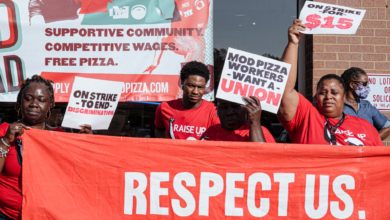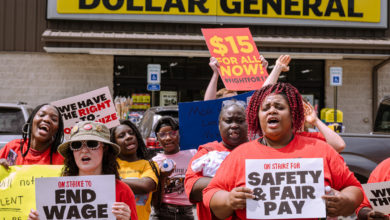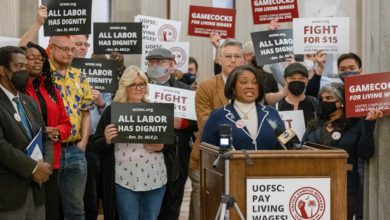If rent cancellation is not provided by the government a year into the pandemic, South Carolina will experience a tidal wave of evictions and increased homelessness. But with the highest eviction rates in the nation, South Carolina has been in a housing crisis long before the start of the COVID-19 pandemic.
Big landlords, private housing corporations, and slumlords have trampled on the rights of tenants to safe and sanitary housing for decades. Many housing units are not up-to-code. This crisis is not just in the realm of privately owned rental housing but extends to public housing that continues to be criminally underfunded.
Since the passage of the 1937 Housing Act during the Great Depression — as part of the New Deal programs resulting from the pressure of the mass labor and socialist movements — over 2,000 housing authorities oversee approximately 2 million public housing units in the country. In Charleston, multiple public housing projects fall under the jurisdiction of Charleston Housing Authority.
Gadsden Green is one of CHA’s public housing projects; it was last renovated in the 1970s. Like other public housing authorities across the country, CHA too has suffered funding cuts. This steady decline in funding for low-income, state-subsidized housing has led to decay — mold, roaches, rodents, and leaks have become the norm.
Housing authorities neglect the numerous long standing structural, sanitation and maintenance issues tenants face daily. The pandemic has only exacerbated this crisis. In the absence of democratic control over public housing under capitalism, tenants who face substandard housing conditions have little to no recourse holding those responsible accountable.
Under Gadsden Green’s authority, residents reporting mold in their units are not given proper or adequate remediation. They are asked to vacate while a “bleach treatment” is performed. This merely consists of taking a spray bottle with bleach, saturating the affected areas, cleaning superficially and spray painting over to conceal the problem. Concerns of inhaling fumes of a dangerous and disorientating chemical are dismissed. Instead, residents are told to open a window to “air it out,” leaving units with a pungent, lingering odor long after the “remediation.”
Gadsden Green takes this one-size-fits-all approach because they claim the mold infestations are not severe enough for more aggressive and costly treatment. With no state laws in place to regulate and define what proper mold remediation should entail, tenants are left with no legal recourse to fight any injustice or neglect should it arise. The property owners are given carte blanche to address the issue any way they see fit, which in practice is whatever they find to be the most cost effective and convenient.
Exposure to mold can result in a variety of adverse health effects, especially for those with respiratory and immuno-compromised conditions. It can also trigger allergic reactions and asthma symptoms.
Many tenants also face pest infestations exacerbated by the structural issues of the units — which in turn can contribute to the unsanitary conditions that pests like roaches and rodents thrive in. Leaks in the roof and plumbing can give way to bug infestations. The presence of pests can cause severe health risks; the long-term health impacts cannot be overstated.
Tenants face a myriad of problems that they are hesitant to bring to the housing authority out of fear of retaliation. The housing authority takes punitive steps toward tenants for its own failures and shortcomings. Residents have received fines for litter violations when trash is found outside their units, even when they are not responsible for the littering.
Prior to the pandemic, Gadsden Green conducted quarterly inspections of each housing unit, checking for structural and maintenance issues — which it rarely fixes — and sanitation in general. A failed inspection then becomes the basis for a lease violation, and an eventual eviction. As is the case across the country, so-called lease violations continue to be used in South Carolina to evict tenants during the pandemic — despite the CDC eviction moratorium.
Federal funding slashes to the Department of Housing and Urban Development aside, tenants and community organizers are wondering where money being allotted to the city’s public housing is going — as little-to-no renovations have been made to the units in close to a year. Housing authorities have been cutting every corner to keep from spending money no matter the urgency of the service or the human cost of the neglect.
In South Carolina, it has taken a grassroots campaign organized by local “Charles House” activists to force the housing authority to make minimal changes. With the assistance of the South Carolina housing justice coalition, Charles House has been organizing tenants to secure tenants’ rights and fight for changes. Through the process, tenants are learning there is power in organized numbers.
There are many Gadsden Greens across the country; public housing is subject to neglect and left to rot under capitalism. As tenants organize to build the housing justice movement in South Carolina, there is awareness that the right to decent housing is a constant battle under the system. Only the socialist reorganization of society can guarantee quality housing as a human right.





